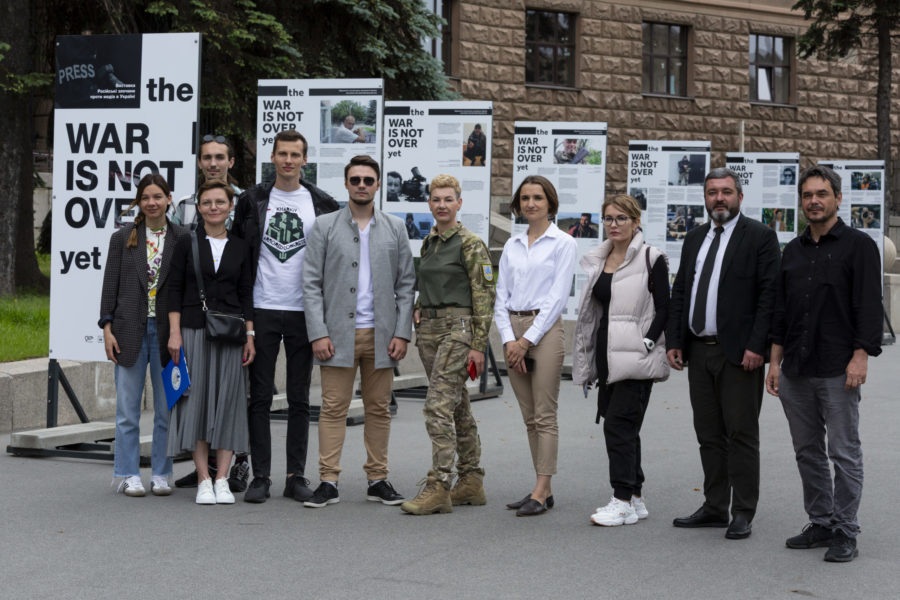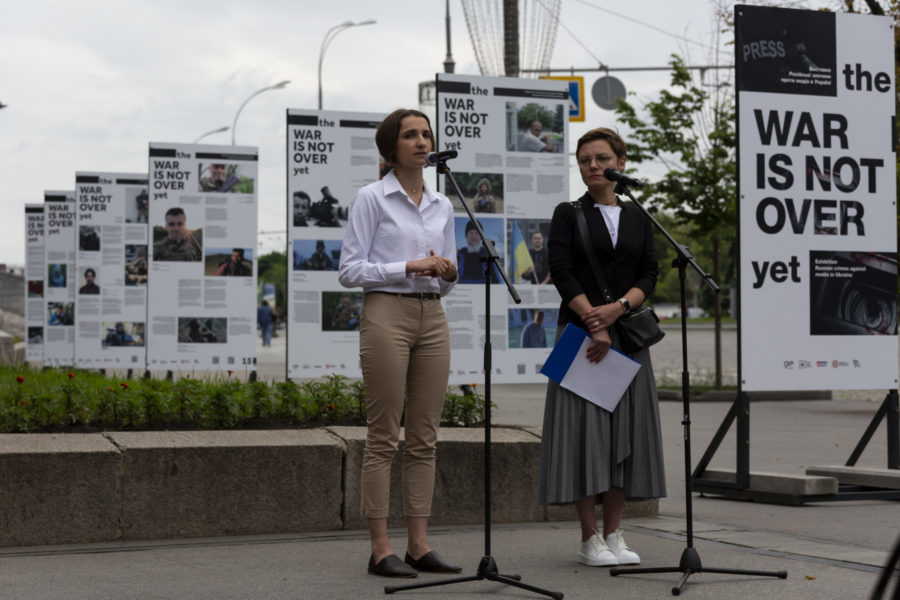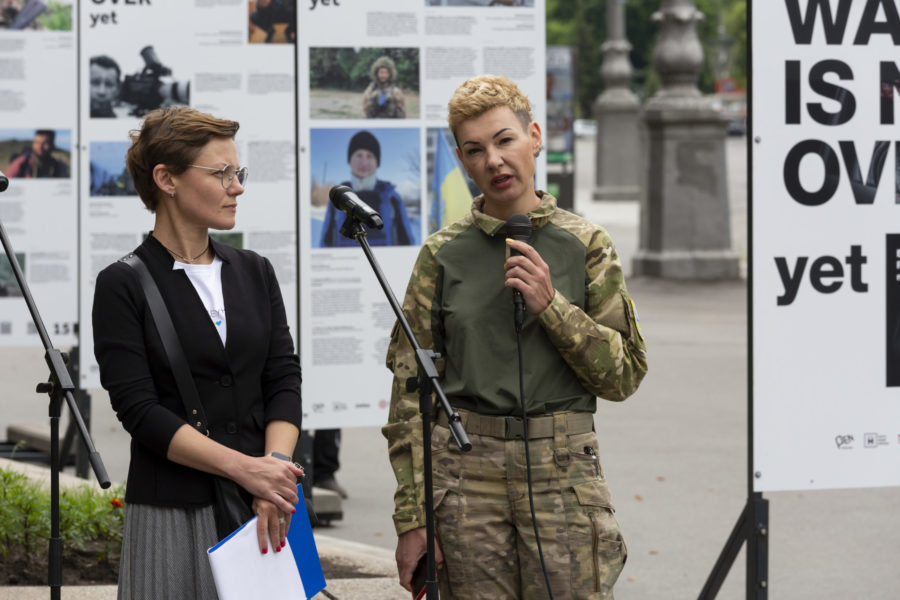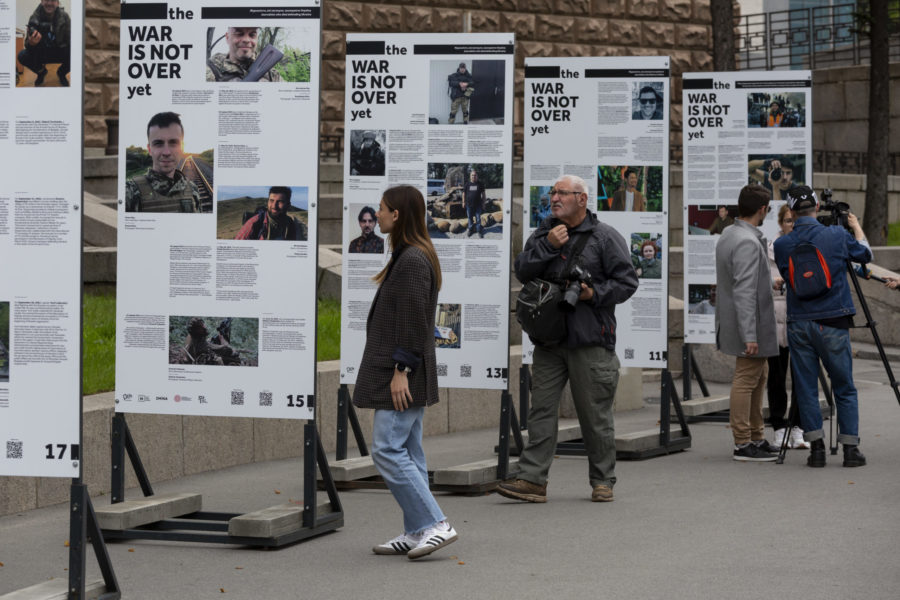Photo exhibition about Russia’s crimes against media workers opens in Kharkiv
The War Is Not Over Yet exhibition about Russia’s crimes against the media in Ukraine opened on Svobody Square in Kharkiv on May 30. It tells about Ukrainian and foreign journalists, camera people, photographers, fixers who were killed, injured, kidnapped since the beginning of the Russian full-scale invasion.

“I could never have imagined that one day we would open a photo exhibition dedicated to the memory of fallen journalists near my alma mater. In the years when we studied journalism at the Karazin University, we did not talk about war correspondents and about work in war conditions. We thought that our future would be a struggle for independent Ukrainian media, not a war that would come to our cities and take the lives of our colleagues. Here, in Kharkiv, you especially feel what war means: you see it in the eyes of people who survived the most difficult months of the blockade of Kharkiv, in destroyed houses and entire districts. The title of our photo exhibition – The War Is Not Over Yet – is primarily a reminder to foreign journalists, diplomats, and politicians that Russia’s genocidal war continues: it destroys our cities, our cultural heritage every day and, what is most terrible, takes the lives of our colleagues, friends and relatives,” said Tetiana Teren, executive director of PEN Ukraine, during the exhibition opening.
According to Borys Samorodov, Vice-Rector for Research and Teaching of the V. N. Karazin Kharkiv National University, Russia has committed many crimes against humanity, and the world knows about them thanks to journalists: “What has Russia done? Thousands of people have been killed, thousands of buildings have been destroyed, and the Karazin University has also suffered losses, we lost more than 40 of our friends, colleagues, and students. We should remember these people and pray for the Ukrainians who defend our land.”
STB TV channel correspondent Maria Malevska shared her memories of soldier and journalist Oleksandr Makhov who had been killed near Izium, Kharkiv region, in 2022.
 Tetiana Teren
Tetiana Teren“A few days before the full-scale invasion started, Oleksandr Makhov came to Kharkiv to hold training for war correspondents. At that time, we did not really believe that we would need this information. I did not take everything that was happening seriously, even when I was streaming from the Kharkiv ring road on the afternoon of February 24 – I was standing next to Russian corpses and damaged equipment, I saw it with my own eyes, and even then I did not understand how serious everything was. As it turned out, every journalist needs to know things told by Oleksandr,” Maria Malevska shared.
According to her, this is a very important exhibition because no one will tell about these people apart from journalists.
“I realized this when one girl wrote to me on Instagram: ‘You know, I am currently abroad, in evacuation. I did not know who Oleksandr Makhov was, I saw the information from you, now I am abroad, and my street, where I was born and grew up in Izium, is now named after him. I saw the eyes of this person, I saw his photo, I now understand thanks to whom Izium is free,” the journalist added.
Servicewoman and journalist, ArmyInform correspondent Oksana Ivanets told about her colleague and friend Valeria Subotina (Karpylenko), a journalist and captain of the National Guard who became a press officer of the Azov Regiment, was captured by the Russians, and recently returned home.
 Oksana Ivanets
Oksana Ivanets“Despite everything that this woman went through, despite the loss of her husband who was killed at Azovstal steel works, she found the strength to continue working and constantly talking about Mariupol. Subsequently, she was held captive for 327 days. When in captivity, she was forced to walk bent over, the occupiers tried to break her. She told them that Ukraine cannot be broken,” said Oksana Ivanets and added that Valeria’s story must be told to the whole world.
The exhibition in Kharkiv will last until June 26. It is located in front of the Northern Building of Vasyl Karazin Kharkiv National University (6 Svobody Square, Kharkiv).

Watch the video from the exhibition opening at the link.
Organizers: PEN Ukraine, Institute of Mass Information, Human Rights Centre ZMINA, National Museum of the Revolution of Dignity, Georgy Gongadze Prize.
Regional partners: V. N. Karazin Kharkiv National University, Kharkiv Media Hub.
Background
According to the Institute of Mass Information data, it is known about 60 media workers killed as of May 30, 2023. Since the beginning of the full-scale invasion, 10 journalists have been killed while performing their professional duties (four Ukrainian citizens, six foreigners among them), 50 media workers have been killed while participating in military operations, as a result of Russian shelling or torture.
In total, since February 24, 2022, the Russians have committed more than 500 crimes against the media.
The War Is Not Over Yet exhibition is an expression of solidarity with media professionals who fight for the truth, risking their own lives, because it is thanks to their work that the international community learns news from the front and sees evidence of Russian war crimes. Journalists in Kharkiv region have repeatedly come under enemy fire, and TV towers and local websites have been attacked by the Russians regularly.
Journalists and servicemen Maksym Medynskyi, Oleksandr Makhov, and Oleksiy Yurchenko were killed in the battles with the occupiers in Kharkiv region. In the first days of the Russian invasion, photographer Ihor Hudenko was killed in Kharkiv. Anatoliy Harahatyi, a blogger from Kharkiv region, spent more than 100 days in Russian captivity, and journalist Danylo Ishchenko was injured during the filming.
Publicist and serviceman Serhiy Zayikovskyi, killed in Kyiv region, was a graduate of the V.N. Karazin Kharkiv National University. Dmytro Shypovskyi, cameraman of the Privat TV: Kharkiv television company, was killed in action in Donetsk region.
The exhibition has been touring Ukrainian cities for about a year. It was already held in Poltava, Kyiv, Boyarka, Vinnytsia, and Odesa.
Photo credit: Mykhailo Nikipielov
If you have found a spelling error, please, notify us by selecting that text and pressing Ctrl+Enter.















